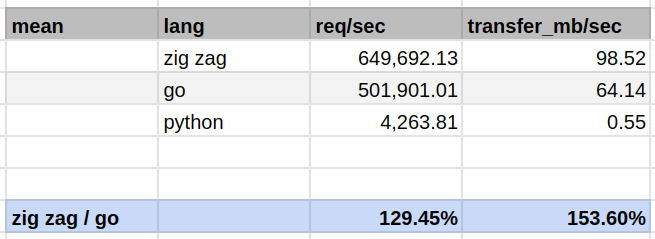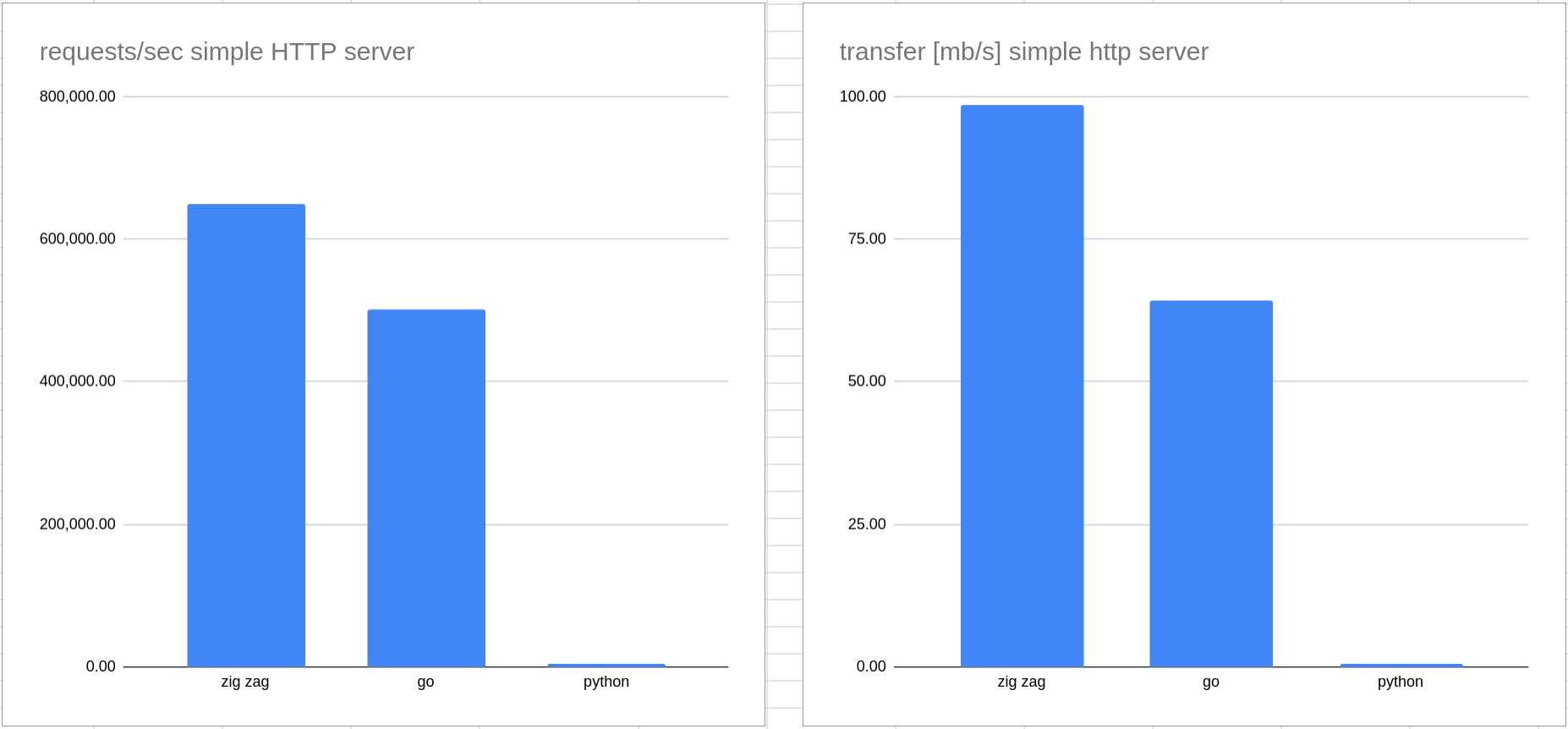| examples | ||
| src | ||
| wrk | ||
| .gitignore | ||
| .gitmodules | ||
| blazingly-fast.md | ||
| build.zig | ||
| LICENSE | ||
| README.md | ||
| shell.nix | ||
| wrk_requests.png | ||
| wrk_summary.png | ||
| wrk_table_summary.png | ||
| wrk_tables.png | ||
| wrk_transfer.png | ||
⚡zap⚡ - blazingly fast backends in zig
Zap is intended to become the zig replacement for the kind of REST APIs I used to write in python with Flask and mongodb, etc.
What I need for that is a blazingly fast, robust HTTP server that I can use with zig. While facil.io supports TLS, I don't mind HTTPS. In production, I use nginx as a reverse proxy anyway.
Zap wraps and patches facil.io - the C web application framework.
⚡ZAP⚡ IS SUPER ALPHA
Here's what works:
- Super easy build process: zag's
build.zigfetches git sub-modules, applies a patch to facil.io's logging for microsecond precision, builds and optionally runs everything.- tested on Linux and macOS (arm, M1)
- hello: welcomes you with some static HTML
- routes: a super easy example dispatching on the HTTP path
- serve: the traditional static web server with optional dynamic request handling
- hello_json: serves you json dependent on HTTP path
- endpoints: a simple JSON REST API example featuring
a
/usersendpoint for PUTting/DELETE-ing/GET-ting/POST-ing users and a/listendpoint returning the entire user list on GET, together with a static HTML and JavaScript frontend to play around with.
I'll continue wrapping more of facil.io's functionality and adding stuff to zap to a point where I can use it as the JSON REST API backend for real research projects, serving thousands of concurrent clients.
⚡blazingly fast⚡
Claiming to be blazingly fast is the new black. At least, zap doesn't slow you down and if your server performs poorly, it's probably not exactly zap's fault. Zap relies on the facil.io framework and so it can't really claim any performance things for itself. In this initial implementation of zap, I didn't care about optimizations at all.
But, how fast is it? Being blazingly fast is relative. When compared with a simple GO HTTP server, a simple zig zap HTTP server performed really good on my machine:
- zig zag was nearly 30% faster than GO
- zig zag had over 50% more throughput than GO
So, being somewhere in the ballpark of basic GO performance, zig zap seems to be ... of reasonable performance 😎.
See more details in blazingly-fast.md.
Getting started
$ git clone https://github.com/renerocksai/zap.git
$ cd zap
$ zig build run-hello
$ # open http://localhost:3000 in your browser
... and open http://localhost:3000 in your browser.
Using ⚡zap⚡ in your own projects
If you don't have an existing zig project, create one like this:
$ mkdir zaptest && cd zaptest
$ zig init-exe
$ git init
With an existing zig project, adding zap to it is easy:
- Add zap as a git submodule
- Add zap to your
build.zig
To add zap as a git submodule:
$ mkdir libs
$ git submodule add https://github.com/renerocksai/zap.git libs/zap
Then, add the following at the top of your build.zig:
const zap_builder = @import("./libs/zap/build.zig");
const zap = std.build.Pkg{
.name = "zap",
.source = std.build.FileSource{ .path = "./libs/zap/src/zap.zig" },
};
In the build function, add the following before exe.install():
exe.addPackage(zap);
zap_builder.addZap(exe, "./libs/zap/") catch unreachable;
From then on, you can use the zap package in your project. Check out the examples to see how to use zap.
Examples
You build and run the examples via:
$ zig build [EXAMPLE]
$ ./zig-out/bin/[EXAMPLE]
... where [EXAMPLE] is one of hello, routes, or serve.
Example: building and running the hello example:
$ zig build hello
$ ./zig-out/bin/hello
To just run an example, like routes, without generating an executable, run:
$ zig build run-[EXAMPLE]
Example: building and running the routes example:
$ zig build run-routes
hello
const std = @import("std");
const zap = @import("zap");
fn on_request(r: zap.SimpleRequest) void {
if (r.path) |the_path| {
std.debug.print("PATH: {s}\n", .{the_path});
}
if (r.query) |the_query| {
std.debug.print("QUERY: {s}\n", .{the_query});
}
_ = r.sendBody("<html><body><h1>Hello from ZAP!!!</h1></body></html>");
}
pub fn main() !void {
var listener = zap.SimpleHttpListener.init(.{
.port = 3000,
.on_request = on_request,
.log = false,
});
try listener.listen();
std.debug.print("Listening on 0.0.0.0:3000\n", .{});
// start worker threads
zap.start(.{
.threads = 2,
.workers = 2,
});
}
serve
const std = @import("std");
const zap = @import("zap");
fn on_request(r: zap.SimpleRequest) void {
// TODO: send 404 response
_ = r.sendBody("<html><body><h1>404 - File not found</h1></body></html>");
}
pub fn main() !void {
var listener = zap.SimpleHttpListener.init(.{
.port = 3000,
.on_request = on_request,
.public_folder = std.mem.span("examples/serve"),
.log = true,
});
try listener.listen();
std.debug.print("Listening on 0.0.0.0:3000\n", .{});
// start worker threads
zap.start(.{
.threads = 2,
.workers = 2,
});
}
routes
const std = @import("std");
const zap = @import("zap");
fn dispatch_routes(r: zap.SimpleRequest) void {
// dispatch
if (r.path) |the_path| {
if (routes.get(the_path)) |foo| {
foo(r);
}
}
// or default: present menu
_ = r.sendBody(
\\ <html>
\\ <body>
\\ <p><a href="/static">static</a></p>
\\ <p><a href="/dynamic">dynamic</a></p>
\\ </body>
\\ </html>
);
}
fn static_site(r: zap.SimpleRequest) void {
_ = r.sendBody("<html><body><h1>Hello from STATIC ZAP!</h1></body></html>");
}
var dynamic_counter: i32 = 0;
fn dynamic_site(r: zap.SimpleRequest) void {
dynamic_counter += 1;
var buf: [128]u8 = undefined;
const filled_buf = std.fmt.bufPrintZ(
&buf,
"<html><body><h1>Hello # {d} from DYNAMIC ZAP!!!</h1></body></html>",
.{dynamic_counter},
) catch "ERROR";
_ = r.sendBody(std.mem.span(filled_buf));
}
fn setup_routes(a: std.mem.Allocator) !void {
routes = std.StringHashMap(zap.SimpleHttpRequestFn).init(a);
try routes.put("/static", static_site);
try routes.put("/dynamic", dynamic_site);
}
var routes: std.StringHashMap(zap.SimpleHttpRequestFn) = undefined;
pub fn main() !void {
try setup_routes(std.heap.page_allocator);
var listener = zap.SimpleHttpListener.init(.{
.port = 3000,
.on_request = dispatch_routes,
.log = true,
});
try listener.listen();
std.debug.print("Listening on 0.0.0.0:3000\n", .{});
zap.start(.{
.threads = 2,
.workers = 2,
});
}
hello_json
const std = @import("std");
const zap = @import("zap");
const User = struct {
first_name: ?[]const u8 = null,
last_name: ?[]const u8 = null,
};
fn on_request(r: zap.SimpleRequest) void {
if (!std.mem.eql(u8, r.method.?, "GET"))
return;
// /user/n
if (r.path) |the_path| {
if (the_path.len < 7 or !std.mem.startsWith(u8, the_path, "/user/"))
return;
const user_id: usize = @intCast(usize, the_path[6] - 0x30);
const user = users.get(user_id);
var json_to_send: []const u8 = undefined;
if (stringify(user, .{})) |json| {
json_to_send = json;
} else {
json_to_send = "null";
}
std.debug.print("<< json: {s}\n", .{json_to_send});
r.setContentType(.JSON);
_ = r.sendBody(json_to_send);
}
}
const UserMap = std.AutoHashMap(usize, User);
var users: UserMap = undefined;
fn setupUserData(a: std.mem.Allocator) !void {
users = UserMap.init(a);
try users.put(1, .{ .first_name = "renerocksai" });
try users.put(2, .{ .first_name = "Your", .last_name = "Mom" });
}
fn stringify(value: anytype, options: std.json.StringifyOptions) ?[]const u8 {
var buf: [100]u8 = undefined;
var fba = std.heap.FixedBufferAllocator.init(&buf);
var string = std.ArrayList(u8).init(fba.allocator());
if (std.json.stringify(value, options, string.writer())) {
return string.items;
} else |_| { // error
return null;
}
}
pub fn main() !void {
var a = std.heap.page_allocator;
try setupUserData(a);
var listener = zap.SimpleHttpListener.init(.{
.port = 3000,
.on_request = on_request,
.log = false,
});
try listener.listen();
std.debug.print("Listening on 0.0.0.0:3000\n", .{});
// start worker threads
zap.start(.{
.threads = 2,
.workers = 2,
});
}
endpoints
The following only shows the GET functionality implemented on both the /user/
and the /list endpoints. See endpoints for a complete
example, including a HTML + JavaScript frontend.
const std = @import("std");
const zap = @import("zap");
const Endpoints = @import("endpoints.zig");
pub fn main() !void {
const allocator = std.heap.page_allocator;
// setup listener
var listener = zap.SimpleEndpointListener.init(
allocator,
.{
.port = 3000,
.on_request = null,
.log = true,
.public_folder = "./examples/endpoints/html",
},
);
Endpoints.init(allocator, "/user", "/list");
// add endpoints
try listener.addEndpoint(Endpoints.getUserEndpoint());
try listener.addEndpoint(Endpoints.getUserListEndpoint());
// fake some users
var uid: usize = undefined;
uid = try Endpoints.getUsers().addByName("renerocksai", null);
uid = try Endpoints.getUsers().addByName("renerocksai", "your mom");
// listen
try listener.listen();
std.debug.print("Listening on 0.0.0.0:3000\n", .{});
// and run
zap.start(.{
.threads = 2,
.workers = 2,
});
}
const std = @import("std");
const zap = @import("zap");
const Users = @import("users.zig");
const User = Users.User;
// the Endpoints
pub const Self = @This();
var alloc: std.mem.Allocator = undefined;
var endpoint: zap.SimpleEndpoint = undefined;
var list_endpoint: zap.SimpleEndpoint = undefined;
var users: Users = undefined;
pub fn init(
a: std.mem.Allocator,
user_path: []const u8,
userlist_path: []const u8,
) void {
users = Users.init(a);
alloc = a;
endpoint = zap.SimpleEndpoint.init(.{
.path = user_path,
.get = getUser,
.post = null,
.put = null,
.delete = null,
});
list_endpoint = zap.SimpleEndpoint.init(.{
.path = userlist_path,
.get = listUsers,
.post = null,
.put = null,
.delete = null,
});
}
pub fn getUsers() *Users {
return &users;
}
pub fn getUserEndpoint() *zap.SimpleEndpoint {
return &endpoint;
}
pub fn getUserListEndpoint() *zap.SimpleEndpoint {
return &list_endpoint;
}
fn userIdFromPath(path: []const u8) ?usize {
if (path.len >= endpoint.settings.path.len + 2) {
if (path[endpoint.settings.path.len] != '/') {
return null;
}
const idstr = path[endpoint.settings.path.len + 1 ..];
return std.fmt.parseUnsigned(usize, idstr, 10) catch null;
}
return null;
}
pub fn getUser(e: *zap.SimpleEndpoint, r: zap.SimpleRequest) void {
_ = e;
if (r.path) |path| {
if (userIdFromPath(path)) |id| {
if (users.get(id)) |user| {
if (zap.stringify(user, .{})) |json| {
_ = r.sendJson(json);
}
}
}
}
}
pub fn listUsers(e: *zap.SimpleEndpoint, r: zap.SimpleRequest) void {
_ = e;
var l: std.ArrayList(User) = std.ArrayList(User).init(alloc);
if (users.list(&l)) {} else |_| {
return;
}
if (zap.stringifyArrayList(std.ArrayList(User, &l, .{})) |maybe_json| {
if (maybe_json) |json| {
_ = r.sendJson(json);
}
} else |_| {
return;
}
}

